From the rocky white cliffs of Realmonte in Italy to the UNESCO World Heritage site of Shell Beach in Australia, we’ve rounded up ten of the most unusual beaches on planet earth.
Summer wouldn’t be summer without the salty air, gentle breeze, and a refreshing paddle at the beach. Go to any coastline and you’ll more than likely find sun, sea, sand, and surf but what you won’t find are hot mineral pools, olive green sand, or hairy pigs casing the joint. So forget your standard variety and read on for ten of the strangest beaches in the world.
1. Walking on Glass at Glass Beach, Kauai, Hawaii
We’re not talking about shards of glass but a beach of smooth, glistening glass pebbles. The shorelines of Glass beach are covered with millions of brown, aqua, clear and blue sea glass pebbles, from old bottles, flasks, windshields, and windows that have been smoothed by the moving ocean over time. It takes the ocean about 10 to 30 years to smooth each glass, jelly-bean-like pebble. The beach isn’t recommended for bathing due to its rocky coastline but you’ll enjoy the beach-combing anyway.
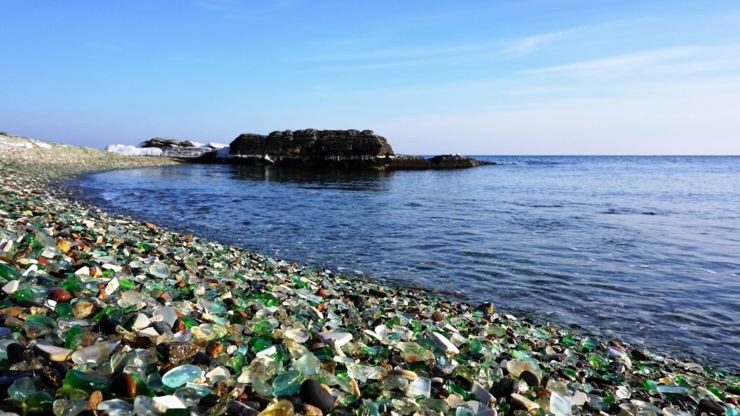
2. Relax at Playa De Gulpiyuri, Llanes, Spain
Playa De Gulpiyuri isn’t your standard sunbathing spot. The stunning 50m long cove surrounded by cliffs and a meadow is one of Spain’s most famed beaches. You won’t find the sea in front of you but you’ll hear the waves sloshing through the underwater tunnels. The inland beach is actually fully tidal and even has waves bathing the small strip of golden sand. Even though the crystal clear water is a little cold, you still won’t be able to resist taking a dip to cool off.

3. Wild Pigs at Big Major Cay, Bahamas
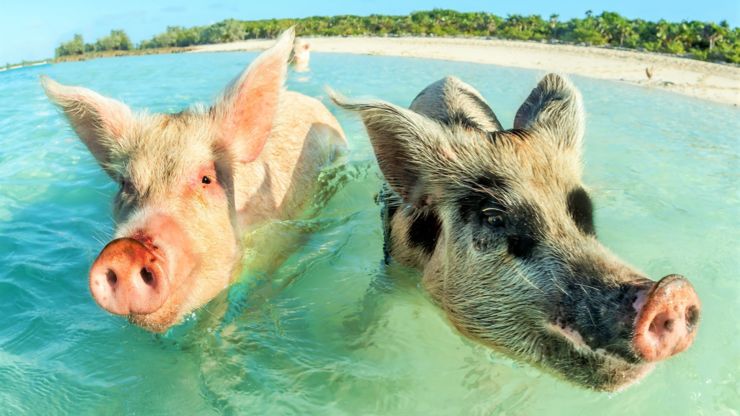
4. Bioluminescence at Vaadhoo beach, Maldives
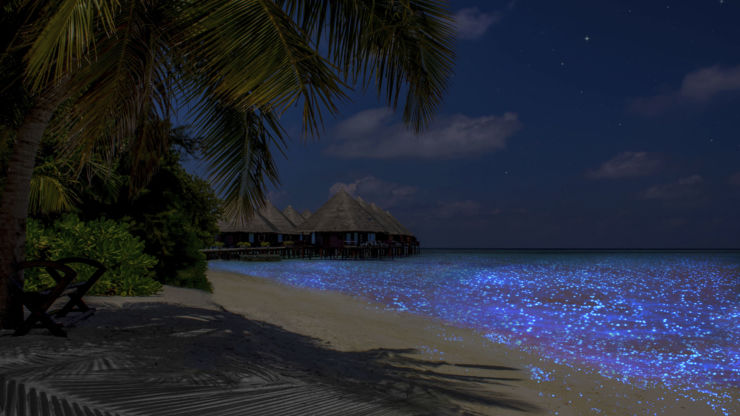
5. Make a Pitstop at Green Sand Beach, Hawaii
Located at the southern tip, just west of South Point, the Big Island of Hawaii’s green sand beach (or Papakolea Beach) is a green olive color due to the semiprecious olivine crystals created by volcanic eruptions. Nestled in Mahana Bay, this is truly a unique place to visit, although swimming isn’t advisable around these parts due to strong waves with howling winds and frequent high surf. Scary.

6. Duck and Cover at Saint Martin Island
Want a quiet and relaxing beach in the Caribbean? You might find the opposite at Saint Martin Island. Adrenaline junkies flock here to feel the breeze in their hair due to the jet blast of overhead planes. Local Princess Juliana Airport is not only really close to the beach but also has an unusually short runway. To complete a smooth landing, the aircraft gets as close to the beginning of the runway as possible, thus flying right over the heads of sunbathers who don’t duck and cover but have their cameras perfectly poised instead.
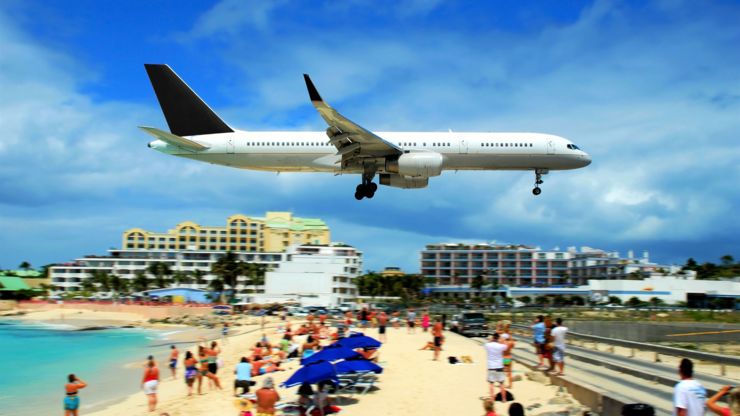
7. Take a dip at Hot Water Beach, New Zealand
Located on Mercury Bay on the east coast of Coromandel Peninsula, Hot Water beach should definitely be on your bucket list while in New Zealand. Within the two hours either side of low tide, visitors flock to the usually deserted Hot Water beach to jump into steamy pools bubbling up through the sand.
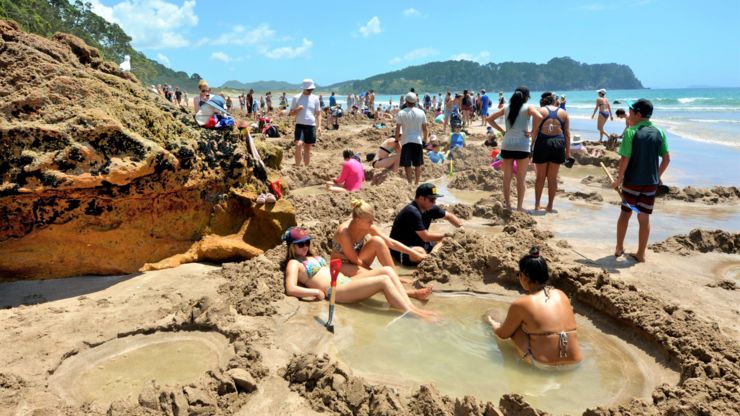
Dig your own spa pool in the sand and relax in the natural springs for the one hour (or two) where low tide makes for the perfect setting. With two fissures bubbling up water as hot as 64 degrees Celsius containing large amounts of salt, calcium, magnesium, potassium, fluorine, bromine, and silica, it’s a strange but amazing feeling to be lying in a pool of hot water just meters from the refreshing sea.
8. A Whiter shade of pale at Hyams Beach, Australia
You can’t beat a classic white sand beach and you won’t find any whiter in the world than at Hyams beach near Jervis Bay, Australia. So while it’s nearly blinding, the beach even has a Guinness World Record to prove it. There’s more to it than just the sand, though. Jervis Bay is actually four times bigger than Sydney Harbour so you’ll have plenty of space to really spread out without encroaching on your neighbor’s sunbathing spot. There are also three national parks nearby so you’re sure to spot a kangaroo or two hopping about.
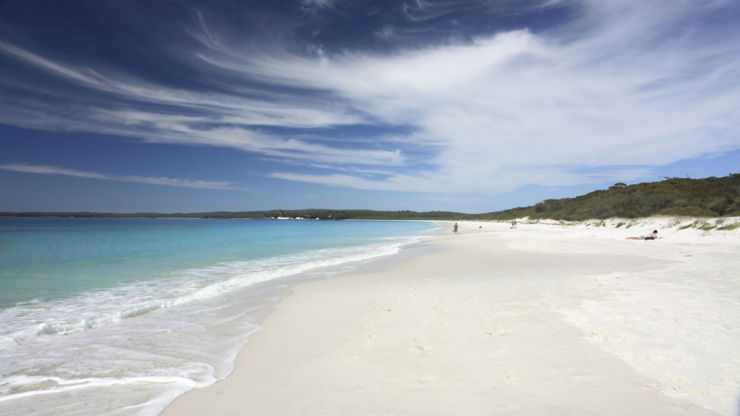
9. Climb the Scala dei Turchi, Realmonte, Italy
Known as the Turkish steps, the white marlstone cliffs at Scala dei Turchi are simply spectacular. Their unusual white color is due to the sedimentary rock, Marl, which forms the Scala. Irresistible to photographers, the rock is a perfect diving board for beach-goers or for a little sunbathing in a secluded spot.
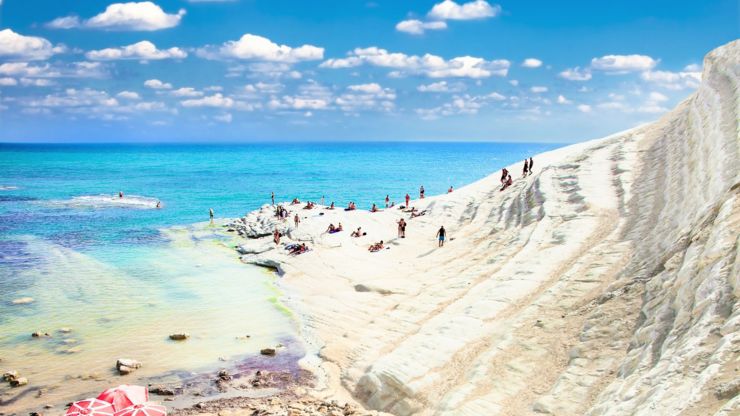
Hike down one of the steep sandy trails to find the locals and tourists covered in wet marl hoping to reap the supposed benefits for the skin. Join in before jumping into the warm Mediterranean Sea below.
10. Beachcomb on Shell Beach, Australia
Created by a unique combination of climate, geography, and marine vegetation, Shell Beach is one of only two in the world composed entirely of shells. Nestled on a narrow isthmus within the UNESCO World Heritage Site of Shark Bay, the areas’ unique marine life such as dugongs (manatees’ relatives), bottlenose dolphins, various whales, whale sharks, and the world’s largest seagrass bank have all contributed to the formation of Shell Beach.
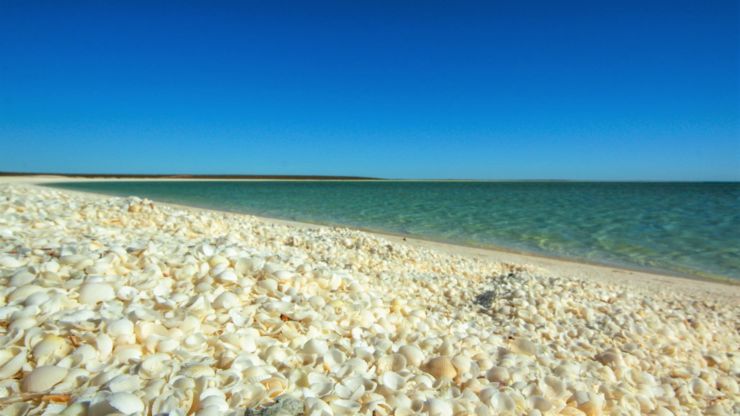
In particular, the seagrass bank has helped to boost the salinity of the ocean twice its usual level, creating the perfect conditions for marine life like cockles who propagate, flourish and die here with their empty shells washing up on the seashore.